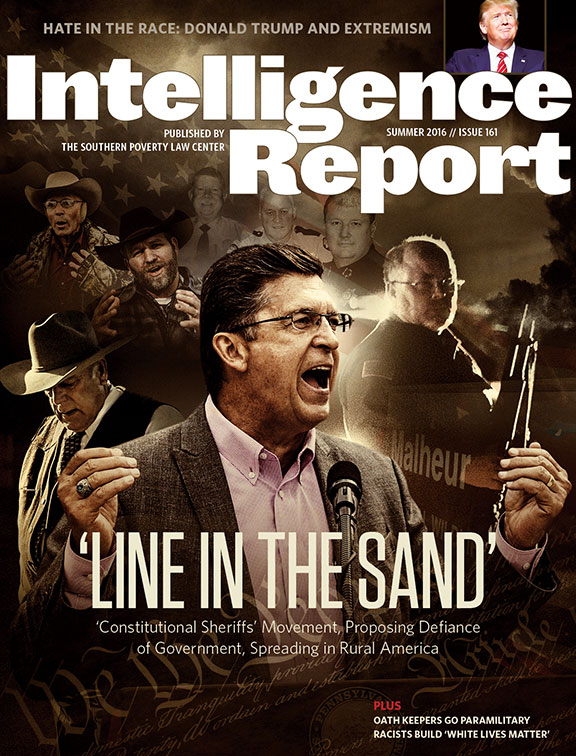From the candidacy of Donald Trump to the British decision to leave the European Union (EU), from the rise of a radical movement of antigovernment county sheriffs to a metastasizing rage aimed at political and economic elites, something important and incredibly dangerous is happening in the Western world.
The beast of right-wing populism is reawakening.
When author Martin Lee titled his 1997 book The Beast Reawakens, the phrase he coined referred to the resurgence of Nazism in Europe. Today, it describes a far larger and far more dangerous set of movements that threaten to tear apart societies in both the United States and Europe. Their ideology is populist — the idea that “pits a virtuous and homogenous people against a set of elites and dangerous ‘others’ who are depicted as depriving the sovereign people” of their prosperity and rights, according to scholars Daniele Albertazzi and Duncan McDonnell.
In the United States, Trump is appealing directly to working- and lower middle-class whites and suggesting that their very real problems and insecurities are the fault of self-interested social elites — traditional politicians of both parties and media leaders — and of “dangerous others,” particularly Mexicans and Muslims. And, in typical populist manner, Trump offers himself up as the strongman who can solve seemingly intractable problems with bold, simple strokes.
In Europe, the leaders of the “Brexit” campaign managed to convince some 52% of voters that the cause of their economic and cultural malaise was a refugee and immigrant crisis enabled by the leaders of the European bloc. Those who voted to quit the EU were overwhelmingly older whites, many of them from the British equivalent of Rust Belt states in America. The sad irony is that those are the very areas that have been subsidized with huge amounts of money from the EU.
In the United States, the disaffection is helping drive a radical movement that seeks to delegitimize government, something seen in the “constitutional sheriffs” movement and the Bundy standoffs examined in this issue. In Europe, beyond the United Kingdom, it is reflected in the rise of populist, and often anti-Semitic and racist, political parties in places like France, Germany, Poland and Hungary.
The causes are complex. Globalization has increasingly knit nations together in a world economy, spurring huge movements of both workers and capital and causing enormous dislocations as a result. Manufacturing wages have been declining across the West for decades, income inequality is at historic levels, and the digital revolution has left those without university-level education far behind.
At the same time, major cultural changes — the rise of large immigrant communities, for instance, and the advance of same-sex marriage — increasingly are making many whites feel that the world they grew up in is disappearing. The idea that the future holds better things is under assault in both America and Europe.
Anne Marie Slaughter, who heads the New America Foundation, compares the present moment to the upheavals seen at the beginning of the 20th century, another period of brutal change. “What we are seeing,” she told The Atlantic in July, “is anger at the disruption of our economy and, really, our social order — of the magnitude we saw when the agricultural age gave way to the industrial age.”
“The digital revolution … is completely upending how we work,” she said, “what the sources of value are, how people can support their families, if they can at all, and creates tremendous fear and rage in the sense that you are at the mercy of forces you cannot control.”
In an essay for the History News Network, scholar Stephen W. Campbell analyzed the roots of Trump voters’ anger but also pointed out that the white working class still has long had it better than American minorities. “Part of [their] anger stems from economic inequality, but a major part, whether they will admit it or not, stems from the fear of rapid demographic change,” he wrote. “They are losing the privilege that has accumulated and redounded to their advantage over generations and almost no one willingly gives up privilege without a fight.”
This kind of rage, nurtured by opportunistic politicians and pundits riding the wave of political discontent, can be hard to quell. In the past, it has led to historic horrors like the rise of populism and racial nationalism that very nearly destroyed Europe in the 1930s and ’40s.
In the wake of the Brexit vote — which was preceded days earlier by the assassination of a pro-EU legislator by a neo-Nazi — Britain experienced a major wave of hate crimes against a whole array of minorities. On our side of the ocean, anti-Muslim violence and terrorist plots against government agencies reflect the rise of populist fury.
To suggest that the West is headed into the kind of social turmoil that led to fascism in Italy and Spain and Nazism in Germany is, hopefully, going too far. But to put the beast of populism back to sleep will require the best efforts of wise leaders, thoughtful voters, and effective government programs — all of which have been in short supply in recent years.



